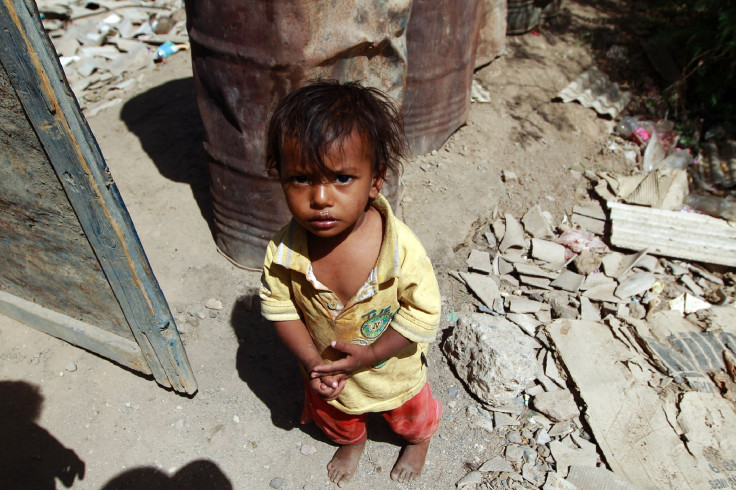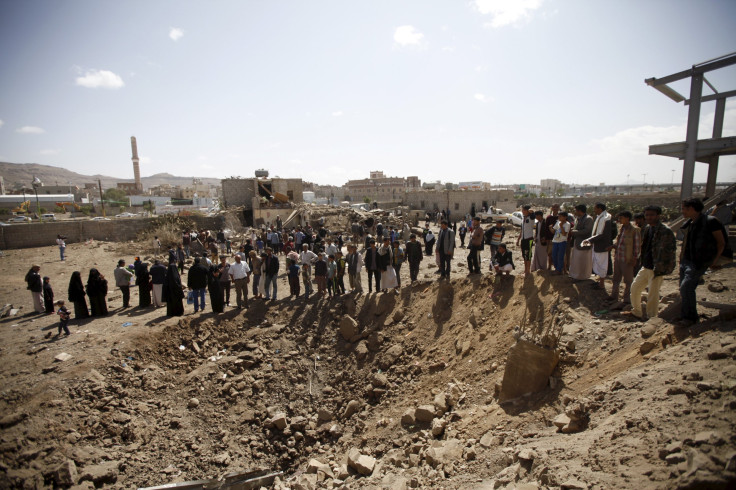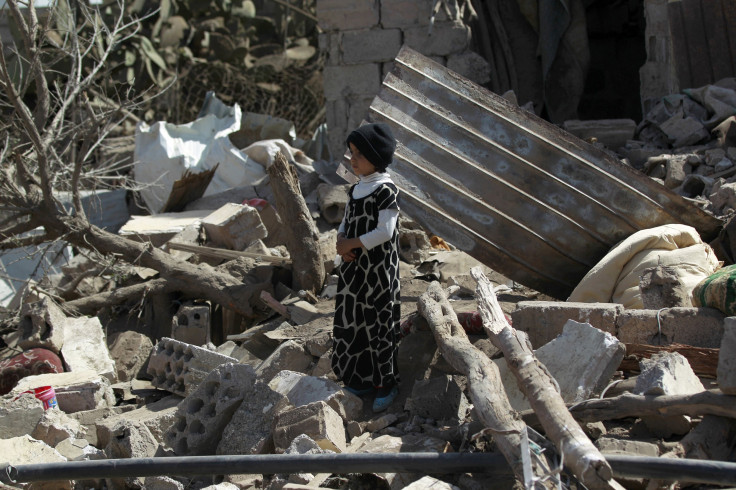Al Qaeda Winning Hearts And Minds Over ISIS In Yemen With Social Services

BEIRUT— Half of Yemen’s 24.4 million people don’t have access to clean water — the most basic of human needs. This stark statistic is in clearest evidence in the country’s Hadramaut region, where oil flows freely but water taps run dry and tribal councils are powerless to improve people’s lives. But there’s a group working to change that. A group that, last week — much to the delight of its parched residents — unveiled a freshly dug well in the country’s arid southern territory. The group’s name? Al Qaeda in the Arabian Peninsula.
AQAP is one of the U.S.-designated terror organization’s most powerful divisions and since the beginning of 2016, the group has quietly seized vast swaths of Yemen, undercutting its rival, the Islamic State group, which has been the main focus of the West’s counterterrorism strategy for the last year. ISIS may have dominated international media coverage, but in Yemen, AQAP has overshadowed its younger sibling with its grassroots approach, providing essential public services to gain the trust of the local population. The group has also been willing to share power with local governing institutions before it establishes its own so-called caliphate.

“ISIS and al Qaeda [have] different [approaches]. ISIS thinks that [it] will brutalize [a population] into submission. Al Qaeda knows that some people are turned off by this brutality,” Thomas Joscelyn, a senior fellow at the Foundation for Defense of Democracies and senior editor of the Long War Journal, told International Business Times. “The entire al Qaeda model is to get as local as possible and embed with the local population.”
In a letter sent from Yemen in 2012, the late leader of al Qaeda’s branch in Yemen, Abu Basir al-Wuhayshi, passed on a piece of acquired jihadi wisdom to his Algerian counterpart: “You have to be kind to [the population under occupation] and make room for compassion and for leniency.”
It was a strikingly pragmatic suggestion from the leader of a group considered to be the greatest threat to the United States and the strongest branch of al Qaeda. However, al Qaeda’s strategy has since evolved from that initial suggestion and adapted to the new geopolitical landscape in the region. The group’s strategy has been particularly successful among its affiliates in Libya, Yemen and Syria.
The Yemen war began a year ago, when Saudi Arabia launched a nine-country coalition to eradicate the Houthi rebels, a Shiite armed political group that took over the country’s capital, Sanaa, from the internationally recognized government in 2014. Since then, the conflict in Yemen, much like the ones in Syria, Iraq and Libya, has drawn in various international powers and the political chaos has left civilians without any form of support from the state.

“It’s like a Game of Thrones with its shifting alliances,” Joscelyn said. “But who is benefiting from Saudi intervention in Yemen? AQAP.”
Under the cover of Yemen’s complex civil war, AQAP, locally referred to as Ansar al-Sharia, has made major gains against the Houthis, the group’s common enemy with the Saudi coalition and forces loyal to Yemeni President Abd Rabbuh Mansour Hadi. AQAP has expanded its hold across four of Yemen’s 21 provinces and now controls the country’s third-largest port city, al Mukalla. And their expansion has been rapidly increasing: Since December, militants affiliated with AQAP seized five cities and two provincial capitals in Yemen’s southern provinces.
“They are filling the [political] vacuum. They’re not calling themselves a state but consistently promoting their public services,” Katherine Zimmerman, a research fellow at the American Enterprise Institute and expert on al Qaeda, told IBT. “Basically, they’re buying goodwill.”
Yemenis are not in a position to reject what AQAP is offering. More than half of Yemen’s population lives below the poverty line. Today, 20 million people — 80 percent of the population — are in need of humanitarian assistance.

Photographs and news articles circulated on AQAP’s social media accounts, and in its propaganda newspaper al-Masra, emphasize how the group has built bridges, dug water wells, repaired roads and distributed humanitarian assistance throughout the areas it controls. The photographs also show militants carrying out punishments according to their version of Sharia law, but the group omits the most brutal scenes from its propaganda.
ISIS has no such qualms: Two weeks ago, the extremist Sunni group claimed a triple suicide bombing in the Yemeni city of Aden, which left 22 people dead. This type of attack is ISIS’ only significant move in Yemen now as the group does not hold territory and isn’t likely to gain any in the future. When the group sent militants from Iraq and Syria to establish a presence in the southwestern peninsula, the majority of the leaders were Saudi Arabian nationals. But Sunnis in Yemen, a deeply tribal population, are “looking for a local face” to fight alongside, Zimmerman said.
This is something al Qaeda has accounted for: The militants have almost imperceptibly embedded with local, pre-existing governing institutions, taking advantage of the Sunni population’s fear of persecution from Shiite Houthi rebels. The group has entered into several contractual partnerships and alliances with Sunni tribal communities, with some members marrying into prominent families in the area to ease relations. The type of contract, and the degree to which AQAP is involved in governance, varies from city to city.
#وكالة_الأثير | فعاليات مهرجان شهداء القصف الأمريكي في مدينة #المكلا بولاية #حضرموت برعاية #أنصار_الشريعة pic.twitter.com/xLCLbQzHfX
— وكالة الأثير (@wkalh22501) March 29, 2016
AQAP’s proxy forces have, on occasion, offered to provide security against the Houthis for a local Sunni tribe until the area is under their control and stability has been established. Al Qaeda has the weapons and training to prepare local tribal fighters to battle the Houthis. In return, the militants request that the tribes no longer allow AQAP’s enemies to enter the area. Power is then, in theory, returned to the tribes.
“People think, ‘Oh, it’s not an AQAP administration, so [al Qaeda] doesn’t control the city,’ ” Zimmerman said. But in reality, this is part of a longer-term strategy where AQAP has “established governance through proxy forces and [controlling] the goods and supplies that flow through.”
The idea of power-sharing may contradict the Islamist doctrine of complete allegiance, but that’s not to say AQAP has given up on its future goal of establishing an emirate. The group is constantly recruiting and training Yemenis who want to fight the Houthis. Last month, the U.S. carried out a drone strike on a training camp in the AQAP-controlled city of al Mukalla, killing roughly 50 militants.
Since the start of the war in Yemen, AQAP has not focused on teaching its new recruits very much about al Qaeda’s ideology, but on providing the weapons and physical training local Sunni populations need to protect their land. But most recruits come round to al Qaeda’s way of thinking.

“After being in the trenches, [recruits] change their minds. It’s a longer-term indoctrination of ideology,” Zimmerman said. “Some al Qaeda fighters are not identifying themselves as al Qaeda. AQAP is not asking for ideological allegiance, that’s why it’s been able to grow its ranks.”
Despite its recent focus on Yemen, AQAP is still considered one of the biggest threats to the United States. The group has some of the most skilled bomb makers in its ranks and has carried out several attacks in the West since 9/11. AQAP’s bomb makers were responsible for the explosive worn in 2009 by the so-called underwear bomber, Umar Farouk Abdulmutallab. A year later, the group claimed responsibility for a printer-cartridge bomb sent to the U.S. via postal mail.
AQAP’s bomb-making capabilities and its ability to carry out large-scale and sophisticated attacks have not lessened. But as a global terrorist movement, al Qaeda has shifted its priorities. A large-scale attack in the U.S. or Europe would draw the international community’s counterterrorism focus away from ISIS, potentially jeopardizing the mobility al Qaeda has recently gained from the current round of regional conflicts.
“The absence of an AQAP attack does not mean that the group cannot conduct attacks, nor that it has abandoned the idea of attacking the U.S.,” Zimmerman said. “It means only that al Qaeda’s leaders are smart enough to take advantage of American distraction to prepare themselves for future struggles.”
© Copyright IBTimes 2024. All rights reserved.






















